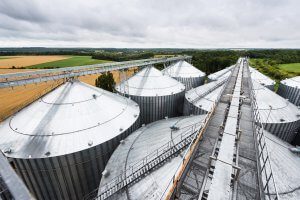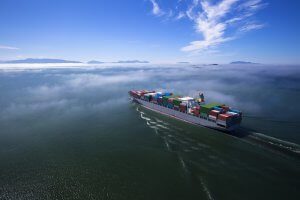
The European Bank for Reconstruction and Development (EBRD) will provide up to $50 million loan to JV Nibulon LLC to support the expansion and modernization of Nibulon’s grain logistics infrastructure in 2018-2019.
EBRD Senior Adviser Anton Usov told Interfax-Ukraine that the project was approved by the bank’s board at a Wednesday meeting.
According to the materials of the bank, the project includes the construction of river terminals, transshipment crane, river fleet and Mykolaiv terminal enhancement.
The project will support Nibulon’s strategy aimed mainly at the expansion and optimisation of its river grain logistics facilities in order to increase grain trading volumes reducing the share of road and rail transportation, which will lead to the improvement of profitability, efficiency, as well as to the reduction of environmental footprint.
The total cost of the project is near $140 million. Technical Cooperation funds are provided by Japan-EBRD Technical Cooperation Fund to partially cover project’s external legal costs.
Nibulon LLC was established in 1991. It is one of the largest operators in the grain market of the country. It has elevators with a total capacity of about 2 million tonnes, as well as its own transshipment terminal with a capacity of 5 million tonnes in Mykolaiv.
Nibulon cultivates 82,000 hectares of land, owns and operates the second largest network of internal elevators and river terminals, a sea terminal in Mykolaiv. The company exports mainly maize, wheat and barley to more than 20 countries. The annual volume of exports reaches 4.5 million tonnes.

State enterprise Artyomsol (Donetsk region) has launched the production of purified food salt, according to a press release issued by the company.
To obtain premium quality salt according to state standard 3583:2015, the process of photoseparation was integrated into the existing technology, which allows removing dark inclusions of natural origin (anhydrides) from rock salt.
“As a result, salt has acquired a more attractive appearance, the content of NaCl it grew to 99%,” the report says.
The production of purified food salt was launched simultaneously at two mines.
Food salt after additional cleaning corresponds to European quality standards.
The program of reconstruction and modernization of all Artyomsol mines began in 2016. The main investment in the purchase of imported high-tech equipment amounted to UAH 23.5 million, which, according to preliminary calculations, will be paid back in 1.5 years.
The plans include the continuation of technical re-equipment of the mines, the transition to production of purified salt on all production lines.

The Cabinet of Ministers of Ukraine has decided to create the Maritime Authority that would start operating from August 1, 2018, Ukrainian Infrastructure Minister Volodymyr Omelyan has said.
“The government resolution on the creation of the Maritime Authority from August 1, 2018 has been issued,” he wrote on his Facebook page.
Government resolution No. 1095 dated September 6, 2017 on the creation of the State Service of Sea and River Transport of Ukraine has been posted on the government’s website.
The service will be the central executive body, whose activities are directed and coordinated by the Cabinet of Ministers through the Minister of Infrastructure, implementing the public policy in the fields of sea and river transport, merchant shipping, navigation on inland waterways, navigation and hydrographic provision of navigation, as well as in maritime security and river transport (except for the safety of navigation of ships of the fishing industry fleet).
According to the authority’s regulations, in accordance with the tasks assigned to it, it, in particular, ensures the preparation of proposals by the Ministry of Infrastructure for the conclusion, termination or suspension of action, denunciation and accession to international treaties on sea and river transport in Ukraine; concludes international treaties of Ukraine of interdepartmental character; develops a strategy for ensuring the fulfillment of the obligations of the state flag, the state port and the coastal state under international treaties in the field of merchant shipping and performs the functions resulting from these obligations; draws up proposals for the integration of the national sea and river transport system into the European and global transport systems and, in accordance with the established procedure, ensures this integration; carries out control over the implementation of international agreements of Ukraine on the safety of navigation and prevention of environmental pollution.
In addition, the authority exercises control over ensuring the security of transportation of goods, passengers and baggage by sea and river vessels; over the state of sea routes, the functioning of traffic control services and pilotage; carrying out rescue operations on sea and river transport, in the water area of seaports, the functioning of radio navigation and observation systems of the maritime mobile service; conducts checks of compliance of the port security systems; coordinates the activities of the captains of seaports within their authority; controls the conclusion of compulsory insurance contracts; conducts investigation and analysis of the causes of marine accidents and transport accidents on inland waterways of Ukraine; carries out licensing of economic activities for the provision of services for transportation of passengers, dangerous goods, hazardous waste by sea and river transport.

The Cabinet of Ministers has approved a concept for development of digital economy of Ukraine until 2020 with the option of its revision at a government meeting on Wednesday, an Interfax-Ukraine correspondent has reported.
“Our ambitious goal is to achieve 5% of GDP by 2021 thanks to the development of the digital economy,” Deputy Economic Development and Trade Minister Mykhailo Titarchuk said during the presentation of the document at a government meeting.
Earlier, First Deputy Prime Minister, Economic Development and Trade Minister Stepan Kubiv said that about one third of the rural population in Ukraine do not have access to broadband Internet, 53% of schools do not have Internet connection, as well as about 99% of healthcare institutions.
“We have determined about 50 indicators of Ukraine’s digital development. By the way, one of the key points of the action plan is the indicators of the development of digital infrastructures, in particular, the maximum coverage with broadband Internet,” Titarchuk said.
In his turn, Ukrainian Foreign Minister Pavlo Klimkin said pointed out the need to confirm the funding declared by the budget and asked the prime minister to take it under his control.
According to Klimkin, the important point of the concept is not only economic, but also its public part.
“We are used to electronic petitions, but there is also an item on electronic elections. The fact that we are affirming this document today attests to our political responsibility that we support electronic voting,” the foreign minister said during the discussion of the document.

Mutual trade between Ukraine and Germany in 2017 grew by 21.5%, the press service of the Cabinet of Ministers of Ukraine has reported after a meeting of Ukrainian Prime Minister Volodymyr Groysman with representatives of leading German companies operating in Ukraine.
“Last year the volume of mutual trade grew by 21.5%, and trade focus shifted towards goods of light and food industries,” the press service said.
According to the report, the construction sector remained interesting sector for investors.
German Ambassador to Ukraine Ernst Reichel said that his country pays much attention to Ukraine’s achievements in fighting corruption, judicial reform and cooperation with international financial institutions (IFIs).

DTEK Energy holding has signed a contract with GE Renewable Energy for the supply, installation and maintenance of 26 wind turbines with a capacity of 3 MW each, the press service of the Ukrainian company has reported.
“The equipment is designed for the construction of the first phase of Prymorska wind power plant with a capacity of 200 MW in Zaporizhia region. The wind turbines will be delivered to Ukraine and installed at the site of Prymorska plant in 2018,” the report said.
The commissioning of the two stages of Prymorska wind power plant of 100 MW each is planned until 2020. The total planned volume of investments in the construction of Prymorska wind farm is more than EUR300 million.
As reported, DTEK in 2011 started the construction of Botiyevska wind power plant in Zaporizhia region and in October 2012 launched its first phase. At present, the installed capacity of Botiyevska wind power plant is 200 MW.